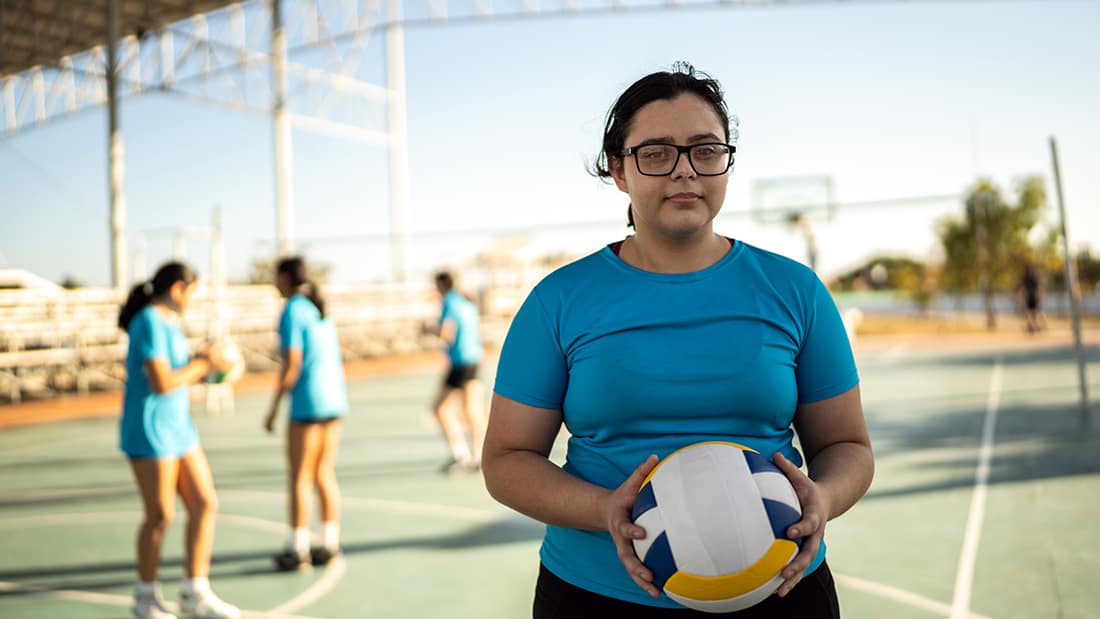How Athletes Stay Motivated
Most athletes experience times when they just don’t feel motivated. For some, it might mean not wanting to go to practice. For others, it gets to a point where they lose interest in athletics altogether. Wherever you fall in the spectrum, STACK offers several ways to get out of your funk and back to being motivated.
There are two types of motivation—extrinsic and intrinsic. Athletes with extrinsic motivation are moved by external factors, such as fame, money or other people doubting them. Intrinsic motivation comes from within.
Which type should an athlete rely on to get to the next level?
Certified sports psychologist Tami Eggleston believes intrinsic motivation is a stronger driver. She says, “This would be the athlete who primarily performs because of the internal feelings of accomplishment, satisfaction, they like a challenge, they like competition, or they just love the sport or activity.”
Many athletes compete for both types of reasons. But according to Eggleston, intrinsic motivation should outweigh extrinsic factors. An athlete who plays primarily for fame and fortune is more likely to get off track, because hitting the weight room and practicing drills five or six days a week brings no glory. An athlete motivated by love of the game is more likely to succeed, because he or she takes pride in the little things—like a good workout and improving skills.
Some might think that external factors can boost intrinsic motivation, but research suggests the opposite it true: too many extrinsic rewards reduce intrinsic motivation.
Bottom line: to stay motivated as an athlete, you need to focus on intrinsic motivation. Here are five strategies that can help.
1. For Love Of The Game: Nothing cures a listless workout like remembering why you’re in the gym in the first place. Every athlete has bad days; to get over the hump, think about why you love your sport. “Think back to those early experiences in your sport that just make you smile,” suggests Eggleston.
2. Change It Up: Practicing the same drills and training the same way every day can sap your motivation. So mix things up. Try a different type of training that gets you out of the gym. Conduct your individual practice sessions somewhere other than your usual venue. Or take a breather from your sport and embrace cross-training by playing something recreationally with your friends [read how cross-training can make you better].
3. Have Fun: Dwight Howard comes to mind as a pro athlete who enjoys his sport. Go to a local playground and play some three-on-three basketball with your friends, or challenge a goalie one-on-one using only trick shots. Whatever you do, don’t forget that sports are fun.
4. Avoid Comparisons: You’re not Michael Jordan, Jim Brown or Hank Aaron. You’re you. Try not to stress out after a bad day or because a teammate played better than you. “Being jealous or envious of others will only make you feel bad about yourself,” says Eggleston. “You should work on constantly improving yourself and capitalizing on your own strengths and working on your own challenges.”
5. Win: Yeah, we know. Easier said than done. But because winning is so difficult, it’s the ultimate source of intrinsic motivation. Nothing makes an athlete feel better than walking off the field of play after a hard-earned victory. But think about the small triumphs too, like successfully completing a drill without error or repping out a personal best on a difficult exercise. Think of them as “wins” to keep yourself motivated as you continue to chase your ultimate goal.
Eggleston says, “True success is measured by consistently competing and staying motivated over the years.” One game or event does not make or break an athlete. Focusing on intrinsic motivation will keep you motivated throughout your career.
Source: podiumsportsjournal.com
Photo: zimbio.com
RECOMMENDED FOR YOU
MOST POPULAR
How Athletes Stay Motivated
Most athletes experience times when they just don’t feel motivated. For some, it might mean not wanting to go to practice. For others, it gets to a point where they lose interest in athletics altogether. Wherever you fall in the spectrum, STACK offers several ways to get out of your funk and back to being motivated.
There are two types of motivation—extrinsic and intrinsic. Athletes with extrinsic motivation are moved by external factors, such as fame, money or other people doubting them. Intrinsic motivation comes from within.
Which type should an athlete rely on to get to the next level?
Certified sports psychologist Tami Eggleston believes intrinsic motivation is a stronger driver. She says, “This would be the athlete who primarily performs because of the internal feelings of accomplishment, satisfaction, they like a challenge, they like competition, or they just love the sport or activity.”
Many athletes compete for both types of reasons. But according to Eggleston, intrinsic motivation should outweigh extrinsic factors. An athlete who plays primarily for fame and fortune is more likely to get off track, because hitting the weight room and practicing drills five or six days a week brings no glory. An athlete motivated by love of the game is more likely to succeed, because he or she takes pride in the little things—like a good workout and improving skills.
Some might think that external factors can boost intrinsic motivation, but research suggests the opposite it true: too many extrinsic rewards reduce intrinsic motivation.
Bottom line: to stay motivated as an athlete, you need to focus on intrinsic motivation. Here are five strategies that can help.
1. For Love Of The Game: Nothing cures a listless workout like remembering why you’re in the gym in the first place. Every athlete has bad days; to get over the hump, think about why you love your sport. “Think back to those early experiences in your sport that just make you smile,” suggests Eggleston.
2. Change It Up: Practicing the same drills and training the same way every day can sap your motivation. So mix things up. Try a different type of training that gets you out of the gym. Conduct your individual practice sessions somewhere other than your usual venue. Or take a breather from your sport and embrace cross-training by playing something recreationally with your friends [read how cross-training can make you better].
3. Have Fun: Dwight Howard comes to mind as a pro athlete who enjoys his sport. Go to a local playground and play some three-on-three basketball with your friends, or challenge a goalie one-on-one using only trick shots. Whatever you do, don’t forget that sports are fun.
4. Avoid Comparisons: You’re not Michael Jordan, Jim Brown or Hank Aaron. You’re you. Try not to stress out after a bad day or because a teammate played better than you. “Being jealous or envious of others will only make you feel bad about yourself,” says Eggleston. “You should work on constantly improving yourself and capitalizing on your own strengths and working on your own challenges.”
5. Win: Yeah, we know. Easier said than done. But because winning is so difficult, it’s the ultimate source of intrinsic motivation. Nothing makes an athlete feel better than walking off the field of play after a hard-earned victory. But think about the small triumphs too, like successfully completing a drill without error or repping out a personal best on a difficult exercise. Think of them as “wins” to keep yourself motivated as you continue to chase your ultimate goal.
Eggleston says, “True success is measured by consistently competing and staying motivated over the years.” One game or event does not make or break an athlete. Focusing on intrinsic motivation will keep you motivated throughout your career.
Source: podiumsportsjournal.com
Photo: zimbio.com












